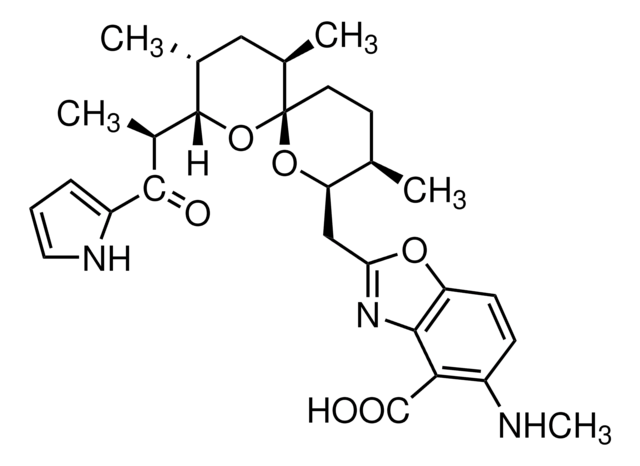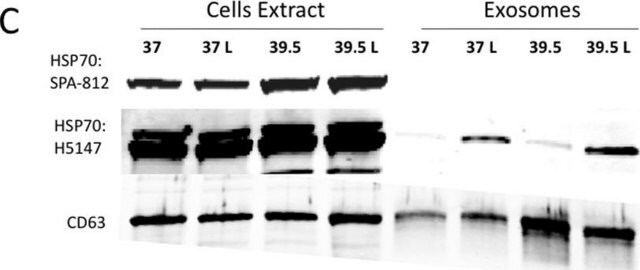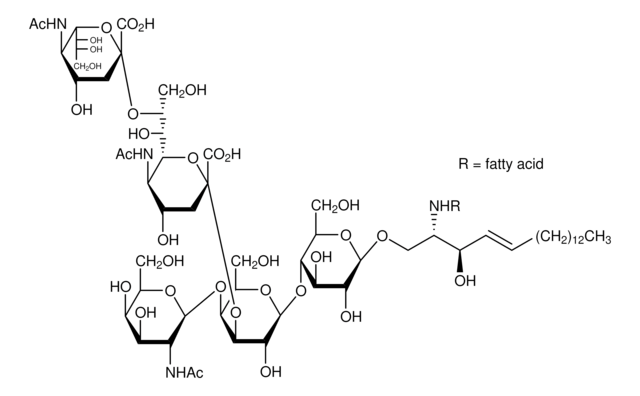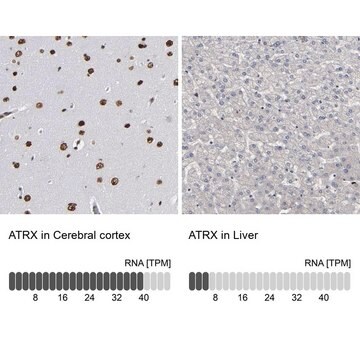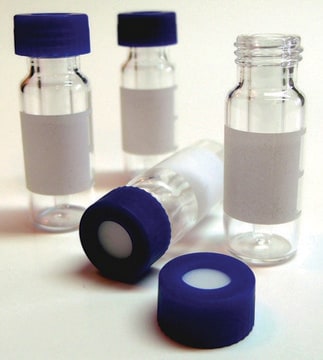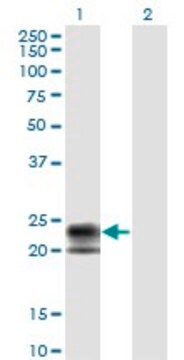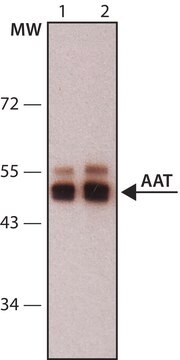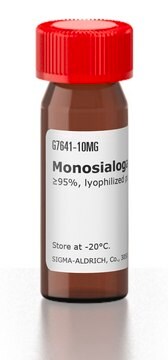SRP3010
BCMA human
recombinant, expressed in E. coli, ≥98% (SDS-PAGE), ≥98% (HPLC), suitable for cell culture
Synonym(e):
B-Cell Maturation Antigen, BCM, TNFRSF17
Anmeldenzur Ansicht organisationsspezifischer und vertraglich vereinbarter Preise
Alle Fotos(1)
About This Item
UNSPSC-Code:
12352202
NACRES:
NA.32
Empfohlene Produkte
Biologische Quelle
human
Rekombinant
expressed in E. coli
Assay
≥98% (HPLC)
≥98% (SDS-PAGE)
Form
lyophilized
Mol-Gew.
5.3 kDa
Verpackung
pkg of 20 μg
Methode(n)
cell culture | mammalian: suitable
Verunreinigungen
<0.1 EU/μg endotoxin, tested
UniProt-Hinterlegungsnummer
Versandbedingung
wet ice
Lagertemp.
−20°C
Angaben zum Gen
human ... TNFRSF17(608)
Allgemeine Beschreibung
B-cell maturation antigen (BCMA) or tumor necrosis factor receptor superfamily member 17(TNFRSF17), a member of the tumor necrosis factor (TNF) receptor superfamily, binds to B-cell–activating factor (BAFF) and a proliferation-inducing ligand (APRIL). BCMA is expressed on mature B-cells and other B-cell lines. The human BCMA gene codes for a 184 amino acid type I transmembrane protein, which contains a 54 amino acid extracellular domain, a 23 amino acid transmembrane domain, and a 107 amino acid cytoplasmic domain. Recombinant soluble human BCMA is a 50 amino acid polypeptide (5.3kDa) comprising the TNFR homologous region of the BCMA protein.
Biochem./physiol. Wirkung
B-cell maturation antigen (BCMA) or tumor necrosis factor receptor superfamily member 17 (TNFRSF17) plays an important role in B cell development, function and regulation. BCMA also has the capability to activate nuclear factor-κB (NF-κB), janus kinase (JNK) and mitogen activated protein kinases (MAPKs). The protein is expressed in certain cancers like glioblastoma, chronic lymphocytic leukemia, Hodgkin lymphoma and multiple myeloma. It has a role in the maintenance of survival of long-lived plasma cells in bone marrow.
Sequenz
AGQCSQNEYF DSLLHACIPC QLRCSSNTPP LTCQRYCNAS VTNSVKGTNA
Physikalische Form
Lyophilized with no additives.
Rekonstituierung
Centrifuge the vial prior to opening. Reconstitute in water to a concentration of 0.1-1.0 mg/ml. Do not vortex. This solution can be stored at 2-8°C for up to 1 week. For extended storage, it is recommended to further dilute in a buffer containing a carrier protein (example 0.1% BSA) and store in working aliquots at -20°C to -80°C
Lagerklassenschlüssel
11 - Combustible Solids
WGK
WGK 3
Hier finden Sie alle aktuellen Versionen:
Besitzen Sie dieses Produkt bereits?
In der Dokumentenbibliothek finden Sie die Dokumentation zu den Produkten, die Sie kürzlich erworben haben.
B cell maturation antigen, the receptor for a proliferation-inducing ligand and B cell-activating factor of the TNF family, induces antigen presentation in B cells.
Yang M
Journal of Immunology, 175(5), 2814-2824 (2005)
Christine M Coquery et al.
Critical reviews in immunology, 32(4), 287-305 (2012-12-15)
B cell maturation antigen (BCMA) is a tumor necrosis family receptor (TNFR) member that is predominantly expressed on terminally differentiated B cells and, upon binding to its ligands B cell activator of the TNF family (BAFF) and a proliferation inducing
P Rennert et al.
The Journal of experimental medicine, 192(11), 1677-1684 (2000-12-06)
A proliferation-inducing ligand (APRIL) is a ligand of the tumor necrosis factor (TNF) family that stimulates tumor cell growth in vitro and in vivo. Expression of APRIL is highly upregulated in many tumors including colon and prostate carcinomas. Here we
Han-Wen Huang et al.
Proceedings of the National Academy of Sciences of the United States of America, 110(27), 10928-10933 (2013-06-19)
Glycosylation, an important posttranslational modification process, can modulate the structure and function of proteins, but its effect on the properties of plasma cells is largely unknown. In this study, we identified a panel of glycoproteins by click reaction with alkynyl
G Yu et al.
Nature immunology, 1(3), 252-256 (2001-03-23)
We report that the tumor neurosis factor homolog APRIL (a proliferation-inducing ligand) stimulates in vitro proliferation of primary B and T cells and increases spleen weight due to accumulation of B cells in vivo. APRIL functions via binding to BCMA
Unser Team von Wissenschaftlern verfügt über Erfahrung in allen Forschungsbereichen einschließlich Life Science, Materialwissenschaften, chemischer Synthese, Chromatographie, Analytik und vielen mehr..
Setzen Sie sich mit dem technischen Dienst in Verbindung.